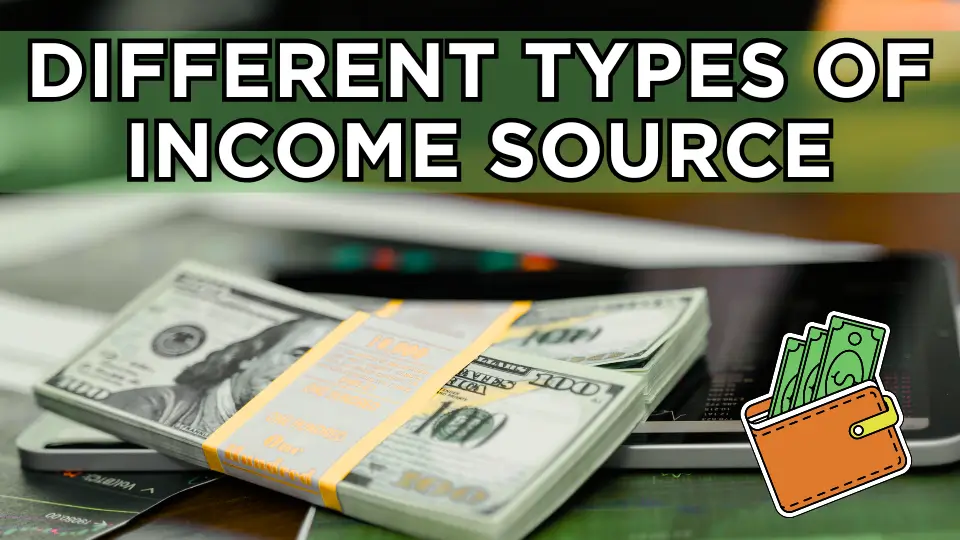Hey there, future money wizards! Welcome to a special journey – “Understanding Your Source of Income: A Comprehensive Guide.”
Now, I know the words “income” and “comprehensive” might sound a bit fancy, but stick with me because we’re about to make understanding money super cool and easy!

Imagine money as a mysterious puzzle, and this guide is like your treasure map to unlock its secrets. Whether you’re navigating the jungle of your first job or you’ve been on this adventure for a bit, we’re here to break down everything about where your money comes from.
Picture this: your income is like a superhero with different powers. We’ll get to know each power – your job, any extra ways you make money, and even how your money can grow on its own! No boring lectures or confusing words – just fun and simple explanations.
Think of it as levelling up in a video game – each chapter is a new level, and you’re gaining epic skills to become a financial superhero yourself. By the end, you’ll be the master of your money realm, making wise decisions and feeling confident about your financial journey.
So, grab your cape and join me on this quest to Understanding Your Source of Income. It’s time to unlock the superpowers of money and become the hero of your own financial story! Ready? Let’s dive in!
What is Source of Income?
The source of income meaning is like your money’s origin story. Ever wondered, what does source of income mean? It’s just understanding where your funds come from.

Picture it as the different branches of your money tree. In simple terms, it’s all the ways you earn cash. This guide is here to make it a breeze. So why bother figuring this out? Well, think of it as knowing the recipe for your financial stew. Each ingredient (or source) contributes to the flavor of your financial pot.
Dive into this guide to explore how your job, investments, or other hustles add up. Understanding your income sources helps you make smart money moves, steering your financial journey in the right direction.
Gain control over your cash flow, boost your financial IQ, and make informed decisions for a brighter financial future. Let’s make financial wisdom simple and accessible!
Source of Income Example:-
Certainly! Here are a few examples of sources of income:
- Employment Salary: The money you earn from your job, whether it’s a monthly, bi-weekly, or weekly paycheck.
- Self-Employment Income: If you run your own business or work as a freelancer, the income generated from your services or products is a source of income.
- Investment Returns: Earnings from investments such as stocks, bonds, mutual funds, or real estate contribute to your income.
- Rental Income: If you own property and receive payments from tenants, that’s another income source.
- Business Profits: If you’re a business owner, the profits generated by your business operations constitute a income source.
- Side Jobs or Gig Economy: Additional income from part-time jobs, freelancing, or gig work adds to your overall earnings.
- Pensions and Retirement Plans: Payments from pensions, 401(k)s, or other retirement plans become a source of income in your post-working years.
- Social Security Benefits: For those eligible, Social Security payments can serve as a source of income, especially during retirement.
- Royalties and Licensing Fees: If you own intellectual property like books, music, or patents, the royalties and licensing fees can contribute to your income.
- Alimony or Child Support: In some cases, legal payments received as alimony or child support are considered a source of income.
Understanding and managing these various sources of income is crucial for effective financial planning.
What is Not a Source of Income?
When we talk about income, it’s crucial to know what doesn’t count as money you regularly earn. Let’s answer the question: “Which of the Following is Not a Source of Income?”
- Personal Loans:- First off, personal loans don’t count. Sure, they give you some money, but you have to pay it back – it’s not like the money you make from a job.
- Gifts & Prizes:- things like gifts, prizes, or inheritance might make you happy, but they’re not regular sources of income. They’re more like one-time surprises.
So, here are the key points: Personal loans and non-cash gifts or prizes aren’t considered sources of income. Why? Because income is money you regularly get, like your salary or wages.
Loans need to be paid back, and gifts aren’t something you get every month like a paycheck. It’s important to focus on reliable sources of money that come in regularly, helping you plan your finances better for the long run.
Different Types of Source of Income:-

Now, let’s dig deeper into each type of income source. We’ll look all sources that generates your cash flow and help you better understand these all to improve your financial stability.
1. Active Income
Active income refers to the money earned through direct and ongoing efforts, typically associated with active participation in a job, business, or trade.
This includes wages, salaries, commissions, and income generated from self-employment or freelance work, where individuals exchange their time and skills for compensation.
READ MORE 👉 What is Active Income and Why You Should Always Have One?
2. Passive Income
Passive income is money earned with minimal effort or direct involvement. It often comes from investments, rental properties, royalties, or business activities where individuals have set up systems to generate revenue without constant active engagement.
Unlike active income, passive income allows for a more hands-off approach, providing the potential for financial growth with less day-to-day involvement.
READ MORE 👉 What is Passive Income Stream & Why Creating One is Always Crucial?
Recurring Revenue Income
Recurring income refers to regular and predictable earnings that are generated repeatedly over time. These types of income typically occurs through ongoing sources such as subscriptions, royalties, or contractual agreements where payments are received at regular intervals.
Recurring income provides a stable and consistent financial flow, offering a degree of predictability for individuals or businesses.
READ MORE 👉 Recurring Revenue Business Model:- A Comprehensive Guide
Residual Income
Residual income is the money earned continuously after completing a specific task or making an initial effort. It often stems from investments, business ventures, or creative works that continue to generate income over time with minimal ongoing effort.
Residual income allows individuals to benefit from their past efforts, creating a more sustainable and potentially passive source of earnings.
READ MORE 👉 Residual Income Mastery: A Comprehensive Guide for Beginners!
3. Investment Income
Investment income refers to the money earned from various financial investments. This can include dividends from stocks, interest from bonds or savings accounts, and capital gains from the sale of assets like real estate or securities.
It allows individuals to grow their wealth over time by putting their money to work in different financial instruments, generating returns beyond what might be earned through traditional employment or active business involvement.
READ MORE 👉 What is Investment Income & How it Works? An Ultimate Guide
Portfolio Income
Portfolio income is the profit gained from the buying and selling of investments, reflecting the capital appreciation or depreciation within an individual’s investment portfolio.
It reflects the changes in the value of the investments held in the portfolio over time. It, also known as capital gains income, is derived from the appreciation of an individual’s investment portfolio.
READ MORE 👉 Decoding Portfolio Income: A Comparison with Passive Income
Why you Always Consider An Active Income Source?
Let Explain Why you might not want to have passive income as your only source of income:- Imagine relying only on passive income is like having all your eggs in one basket. Passive income, which comes from investments or royalties, can be unpredictable. The amount you get might change based on the stock market or other factors you can’t control.
- Having only passive income means you don’t have money coming in regularly, like a paycheck from a job.
- If something happens to your investments or the market, your income could drop suddenly, and that might cause financial stress.
- It’s like having a variety of foods in your diet to stay healthy – you wouldn’t eat only one thing every day. Similarly, having different sources of income, including a job or business, can help you have a more stable financial situation. That way, even if one source slows down, you still have other ways to support yourself.
In simple terms, it’s good to have a mix of active and passive income to make sure your financial life is more secure and less risky.
Why you must create Multiple sources of income?

Creating multiple sources of income is like building a strong financial safety net. Relying on just one source of money, like a job, can be risky. Here’s why having more than one source is a smart idea:
- Security: Diversifying income sources provides a safety net, reducing vulnerability to unexpected job loss or economic downturns.
- Diversification: Similar to planting different crops to mitigate weather risks, having various income streams spreads financial risk and safeguards against industry-specific challenges.
- Adaptability: In a dynamic economic landscape, multiple income sources enhance adaptability, allowing individuals to navigate changes and capitalize on new opportunities.
- Financial Growth: Supplementary streams, such as investments or side businesses, offer avenues for wealth accumulation and potential for increased earnings over time.
- Risk Mitigation: Depending on a single source of income exposes individuals to higher risks; diversification reduces the impact of challenges in one area.
- Flexibility: A diversified income portfolio provides flexibility, enabling individuals to adjust to changing circumstances without facing severe financial repercussions.
- Psychological Well-being: Knowing there are alternative income sources contributes to peace of mind, reducing stress and increasing confidence in facing future challenges.
- Long-Term Prosperity: Building multiple income streams fosters a comprehensive financial portfolio, contributing to long-term financial prosperity.
- Opportunity for Passive Income: Creating diverse income sources can include passive income streams, providing money without constant active involvement and creating a more balanced financial strategy.
- Emergency Preparedness: Having multiple income sources ensures preparedness for unexpected expenses or emergencies, reducing the financial impact of unforeseen events.
In summary, creating multiple sources of income is a wise strategy for financial stability, growth, and peace of mind in an ever-changing world.
How to have multiple sources of income?

Diversifying your sources of income is a smart financial strategy that can provide stability and enhance your overall financial well-being. Here are some ideas to consider:
Employment:
- Hold a full-time job and explore opportunities for career growth and salary increases.
- Consider part-time or freelance work in your field of expertise.
Side Hustles:
- Identify your skills or hobbies that can be monetized and start a side business.
- Offer freelance services online, such as writing, graphic design, or coding.
- Participate in the gig economy by driving for rideshare services or delivering food.
Investing:
- Invest in stocks, bonds, or mutual funds to generate passive income through dividends or capital gains.
- Consider real estate investments, such as rental properties or real estate crowdfunding.
Real Estate:
- Rent out a portion of your property, such as a room on platforms like Airbnb.
- Purchase rental properties to generate regular rental income.
Online Business:
- Create and sell digital products, such as ebooks, online courses, or stock photos.
- Start a blog or YouTube channel and monetize it through ads, sponsorships, or affiliate marketing.
Passive Income Streams:
- Develop and sell digital products or software that can generate ongoing revenue.
- Invest in a business as a silent partner or through crowdfunding platforms.
Multiple Jobs:
- Take on part-time or temporary jobs to supplement your main income.
- Explore opportunities for overtime or additional shifts in your current job.
Consulting:
- Offer consulting services in your area of expertise to individuals or businesses.
- Provide coaching or mentoring services based on your skills and experience.
Education and Training:
- Offer tutoring services in subjects you excel at.
- Create and sell online courses or provide workshops based on your expertise.
Network Marketing:
- Participate in legitimate network marketing opportunities that align with your values and interests.
Remember to carefully evaluate each opportunity, considering factors like time commitment, potential returns, and risks. Building multiple income streams takes time and effort, so it’s essential to prioritize and manage your commitments effectively.
Additionally, seek advice from financial professionals to make informed decisions based on your unique situation and goals.
READ MORE 👉 How to Create Multiple Streams of Income?: Unlocking Prosperity 101
Conclusion
In a nutshell, the guide “Understanding Your Source of Income” shows us how important it is to have different ways of making money.
It talks about different types of income, like from working or investments, and says it’s smart to have more than one source of money. This is called diversification, like having a safety net for our finances in case things change, like losing a job.
The guide also says what doesn’t count as income, such as loans or gifts, to make things clearer. It strongly suggests having different ways to earn money for safety, flexibility, and long-term success.
It’s like having a plan for our money that helps us make smart choices and be ready for anything that might come our way. Overall, it’s a practical guide for making our financial future more secure and successful.
READ MORE 👉 11 Must Read Best Books for Entrepreneurs of All Time 2024
I trust you found this information to be both useful and valuable. If there’s anything more I can include, please feel free to let me know. Kindly share it with anyone who may benefit.
Stay tuned for additional valuable content in the future. Thank you for reading, and have a fantastic day!



